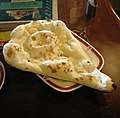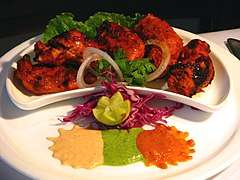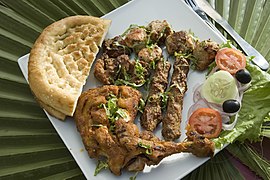Chana masala
Chana masala ([ˈtʃənaː məˈsaːlaː], literally 'mix-spiced small-chickpeas'), also known as channay, chole masala, chole or chholay (plural), is a dish originating from the Indian subcontinent.[1] The main ingredient is a variety of chickpea called chana (चना) or kala chana ('black chana'). They are twice the diameter of typical chickpeas with a stronger flavour and firmer texture even after being cooked.
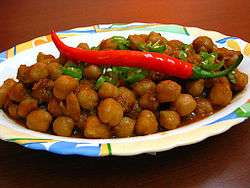 Made with the larger chickpeas | |
| Alternative names | Chole masala |
|---|---|
| Course | Main or Snack |
| Place of origin | Indian subcontinent |
| Region or state | Northern region of the Indian subcontinent |
| Associated national cuisine | India, Bangladesh, Pakistan |
| Serving temperature | Hot |
| Main ingredients | Chickpeas, onion, tomatoes, coriander, garlic, chiles, ginger, oil, spices |
| Variations | Aloo chole, murgh cholay, chole bhature |

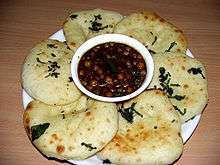
Chole is the name for the larger and lighter coloured chickpea commonly found in the West. These are known as kabuli chana (काबुली चना) in Hindustani. Chana masala is fairly dry and spicy with a sour citrus note (the flavor usually comes from coriander and onion). Chana are usually replaced by chole in most restaurants, and both versions are widely sold as snack food and street food in the Indian subcontinent.
Ingredients
Along with chickpeas, the ingredients of chana masala typically include onion, chopped tomatoes, coriander seed, garlic, chillies, ginger, dried mango powder (amchur, sometimes spelled amchoor), crushed pomegranate seed (anardana), and garam masala.
Regional dishes
India
In India, it is sold by street vendors and restaurants, and may be eaten with puri.
Pakistan
Aloo chole is a Pakistani variation of chana masala made with potatoes or chickpeas. In Lahore, a variation of the dish called murgh cholay is used.
Morocco
Chickpea butternut tagine is a variation from Moroccan cuisine made with spices and roasted squash. The dish is served over hot steamed or flavoured couscous.
References
- Bhagat, Rasheeda (Oct 7, 2005). "Cooking with Ees". The Hindu Business Line.

